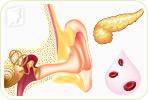Women struggling with dizziness know all too well how difficult it is to carry on with their daily activities and maintain a good quality of life. Fortunately, they can restore hormonal imbalance and alleviate dizzy spells through a variety of approaches.
Continue reading to discover how to stop being dizzy throughout the menopausal transition and enjoy feeling balanced during your midlife years.
Three Approaches to Treating Dizziness
There are three approaches to treating dizziness: (1) Lifestyle changes, (2) Alternative medicine, and (3) Medications, which range from low-risk options to more invasive treatments. It is recommended to start with the most natural approaches and move on to more risky options only if necessary.
Lifestyle Changes for Dizziness Treatment

First-level treatment for dizziness involves the least amount of risk, though it does require the highest amount of self-discipline. Making simple adjustments to one's lifestyle can help women get rid of symptoms safely and naturally.
Nutritious Diet
A woman's dietary habits play an important role in dizziness treatment. A decent menopause diet consists of regular, balanced meals made from lean protein, healthy fats, and complex carbs that are rich in the following nutrients:
- Phytoestrogens, or plant estrogens,work to relieve symptoms of dizziness by promoting hormonal balance.
Soy, tofu, tempeh, flax
- Potassium deficiency, known as hypokalemia, may cause lightheadedness and other types of dizziness.1
Tomatoes, spinach, peas, broccoli
- Vitamin B12 inadequacy can affect coordination and balance, often resulting in dizzy spells.2
Dairy, eggs, meat, beans
- Water is a highly important part of a nutritious diet for dizziness treatment. Dehydration can cause a sudden decrease in blood pressure and oxygen supply to the brain, causing dizziness.3
Women should also cut down consumption of caffeine and refined sugars since they can cause an excessive loss of body fluids or sudden spikes in blood sugar, both potentially resulting in dizziness.4
Regular Exercise
Besides enjoying the numerous benefits of exercise on physical and psychological health, menopausal women can also use workouts to treat dizziness and relieve the burden it has on their daily activities. As an added benefit, staying physically active will also help manage menopausal weight gain and mood swings, among other ailments.
Amount: An ideal exercise routine consists of at least 150 minutes of low- to moderate-level physical activity per week, evenly broken up into shorter, 30-minute trainings.5
Type: Although the best workouts combine aerobic and muscle-strengthening exercises, it is key to adjust routines to what feels good and enjoyable. Long walks, slow stretches, or yoga are great starters.
Useful tips: Women with dizziness are encouraged to approach their workouts with caution and patience. This includes creating comfortable, ventilated spaces; taking their time; and closely monitoring symptoms.
Precautions: Since strenuous exercise can trigger or worsen dizziness and put women at risk of falling, it is important to focus on low- to moderate-level workouts.
Wholesome Habits
Women can complement their diets and exercise regimens with various wholesome habits, which - when practiced consistently - can help relieve dizziness and help them get through this life stage in a more balanced way.
Relieving stress with yoga, meditation, or deep breathing exercises is one of the best solutions to how to stop feeling dizzy since high cortisol levels and emotional distress are one of the most common causes of dizziness.6
Maintaining a healthy sleep schedule is an instrumental part of dizziness treatment since poor sleep quality has been associated with several types of dizziness and compromised daily functions, including balance.7
Keeping a journal to record when dizzy spells happen, including the circumstances surrounding them, can help identify their triggers more quickly and prevent subsequent episodes.
- Quitting addictions to alcohol and nicotine is a must in dizziness treatment as both have been found to negatively affect balance, worsen the symptoms, and compromise overall health.8,9
Alternative Medicine for Dizziness Treatment

The second level of dizziness treatments consists of various alternative medicine approaches, with herbal supplements being the most popular ones. They are an affordable, low-risk way to balance hormones and alleviate menopause symptoms.
There are two types of herbal supplements that may be used in the treatment of dizziness: phytoestrogenic and hormone-regulating supplements.
Phytoestrogenic Supplements
Phytoestrogenic herbs, such as ginseng, contain plant-based compounds that resemble estrogen. When they enter the body, these estrogenic compounds help balance hormone levels and lessen the symptoms of an imbalance, such as dizziness. However, adding outside hormones to the body can directly reduce its capability to produce its own hormones, which may cause a further drop. As such, phytoestrogenic supplements are best used short-term.
Hormone-Regulating Supplements
Hormone-regulating supplements, like Macafem, do not contain plant estrogens or any external hormones. Rather, they promote natural hormone production by nourishing the endocrine glands. The resulting balance helps relieve dizziness and menopause symptoms. These supplements are considered a safe and effective dizziness treatment since they virtually cause no side effects, can be used long-term, and stimulate hormone production from within.
From Nature and Health Magazine, Dr. Chacon says:
"Macafem's nutrients help restore natural hormones in women. Unlike hormone drugs, which are basically resumed in taking synthetic hormones, Macafem acts totally different in your body. It nourishes and stimulates your own natural hormone production by inducing the optimal functioning of the pituitary and endocrine glands." Click on the following link to learn more about Macafem.
A combination of lifestyle changes and herbal supplements is usually the most effective and sufficient treatment for dizziness. However, severe symptoms may require more conventional treatment methods.
Conventional Medicine for Dizziness Treatment

Third-level approaches to treating dizziness often carry the highest cost, and some may come with significant side effects. Nevertheless, conventional medicine can be an invaluable tool in relieving symptoms and treating dizzy spells.
Medications
Medicine to help with dizziness either works by alleviating symptoms or treating the underlying cause to prevent symptoms. Depending on the cause of dizziness, they may include:
Motion sickness medications - like prochlorperazine - may temporarily relieve symptoms of vertigo, but will not help prevent subsequent attacks.
Medications for migraine prevention - like the antidepressant called venlafaxine-are often beneficial for women who experience dizziness with migraines.
Anxiolytics may be prescribed for dizziness if it is brought about by anxiety or panic attacks.
HRT, or hormone replacement therapy, was once a very popular treatment method for menopausal ailments, including dizziness. While it can be a quick and powerful dizziness treatment,it is not prescribed as widely as before since its use has been associated with serious side effects and major health risks, as seen in the following studies.
Medical Procedures & Therapies
There are various procedures and therapies that might help treat dizziness, depending on its type and cause. They may include the following: physical therapist, doctor, or vestibular physiotherapist with a specialty in dizziness.
Physical therapy, including vestibular rehabilitation therapy, may help improve balance and treat dizziness.
Medical procedures, like canalith repositioning procedure, are said to relieve vertigo types of dizziness in about 80% of patients in one or two sessions.12 They must be done by a trained medical professional.
At-home exercises, like Epley maneuver, Brandt-Daroff exercise, or balance retraining exercises, consist of a series of movements that may be taught by a doctor or physical therapist to relieve vertigo and other types of dizziness.
Psychotherapy
Since up to 20% of dizziness cases have psychological roots, women may benefit from psychotherapy, including cognitive behavioral therapy (CBT), to resolve the underlying causes and relieve anxiety and stress.13
The three aforementioned approaches to dizziness treatment can be applied in any combination, depending on symptom severity and a woman's health status. Yet, more and more women manage to relieve symptoms by blending healthy lifestyle changes and hormone-regulating herbal supplements without relying on risky treatments.
A Safe Way of Treating Dizziness
Implementing Lifestyle Changes:
- Eating foods rich in phytoestrogens, potassium, and vitamin B12
- Keeping up with low or moderate exercise in ventilated spaces
- Relieving stress through yoga, meditation, and breathing exercises
- Maintaining a healthy sleep pattern and quitting addictions
And Taking Herbal Supplements:
- Phytoestrogenic herbal supplements, like ginseng
- Or natural hormone-regulating supplements, like Macafem
Sources
- Better Health Channel. (2019). Dizziness and vertigo. Retrieved June 10, 2020 from https://www.betterhealth.vic.gov.au/health/conditionsandtreatments/dizziness-and-vertigo
- DeutschesArzteblatt. (2008). Diagnosis and treatment of vertigo and Dizziness. Retrieved June 10, 2020 from https://www.ncbi.nlm.nih.gov/pmc/articles/PMC2696792/
- Health Direct. (2019). Vertigo. Retrieved June 10, 2020 from https://www.healthdirect.gov.au/vertigo
- John Hopkins University. (). Home Epley Maneuver. Retrieved June 10, 2020 from https://www.hopkinsmedicine.org/health/treatment-tests-and-therapies/home-epley-maneuver
- Mayo Clinic. (2020). Dizziness. Retrieved June 10, 2020 from https://www.mayoclinic.org/diseases-conditions/dizziness/diagnosis-treatment/drc-20371792
- Medline Plus. (2020). Dizziness and Vertigo. Retrieved June 10, 2020 from https://medlineplus.gov/dizzinessandvertigo.html
- University of Michigan. (2019). Brandt-Daroff Exercise for Vertigo. Retrieved June 10, 2020 from https://www.uofmhealth.org/health-library/hw205649
- Vestibular Disorders Association. (n.d.). Balance Retraining. Retrieved June 10, 2020 from https://vestibular.org/sites/default/files/page_files/Documents/Balance%20Retraining_Yardley.pdf
- Vestibular Disorders Association. (n.d.). Vestibular Rehabilitation Therapy (VRT). Retrieved June 10, 2020 from https://vestibular.org/understanding-vestibular-disorder/treatment/treatment-detail-page
Footnotes:
- Case Reports in Nephrology. (2015). An Unexpected Cause of Severe Hypokalemia. Retrieved June 10, 2020 from https://www.ncbi.nlm.nih.gov/pmc/articles/PMC4624913/
- ClinicaChimica Acta. (2010). Acute Presentation of Dizziness in Vitamin B12 deficient Old Patient of Cardiac Disease: A Case Report. Retrieved June 10, 2020 from https://pubmed.ncbi.nlm.nih.gov/20736002/
- Mayo Clinic. (2019). Dehydration. Retrieved June 10, 2020 from https://www.mayoclinic.org/diseases-conditions/dehydration/symptoms-causes/syc-20354086
- Vestibular Disorders Association. (n.d.). Dietary considerations. Retrieved June 10, 2020 from https://vestibular.org/understanding-vestibular-disorders/treatment/vestibular-diet
- American Heart Association. (2018). Recommendations for Physical Activity in Adults and Kids. Retrieved June10, 2020 from https://www.heart.org/en/healthy-living/fitness/fitness-basics/aha-recs-for-physical-activity-in-adults
- The University of Melbourne. (n.d.). Dizziness and Stress. Retrieved June 10, 2020 from https://healthsciences.unimelb.edu.au/__data/assets/pdf_file/0008/1968488/14661-DIZZINESS-And-STRESS-patient-info-sheet.pdf
- PLOS ONE. (2018). Relationship between sleep quality and dizziness. Retrieved June 10, 2020 from https://www.ncbi.nlm.nih.gov/pmc/articles/PMC5841657/
- Alcohol.org. (2020). The Spins: Why Drinking Alcohol Can Cause the Spins. Retrieved June 10, 2020 from https://www.alcohol.org/effects/the-spins/
- Journal of Neurology. (2007). The effect of Nicotine on Perceptual, Ocular Motor, Postural, and vegetative Functions at Rest and in Motion. Retrieved June 10, 2020 from https://pubmed.ncbi.nlm.nih.gov/17990061/
- JAMA. (2002). Risks and benefits of estrogen plus progestin in healthy postmenopausal women: principal results from the Women's Health Initiative randomized controlled trial. Retrieved June 10, 2020 from https://www.ncbi.nlm.nih.gov/pubmed/12117397
- The Lancet. (2019). Type and timing of menopausal hormone therapy and breast cancer risk: individual participant meta-analysis of the worldwide epidemiological evidence. Retrieved June 10, 2020 from https://www.thelancet.com/journals/lancet/article/PIIS0140-6736(19)31709-X/fulltext
- Mayo Clinic. (2018). Canalith repositioning procedure. Retrieved June 10, 2020 from https://www.mayoclinic.org/tests-procedures/canalith-repositioning-procedure/about/pac-20393315
- New Zealand Government. (2018). Dizziness. Retrieved June 10, 2020 from https://www.health.govt.nz/your-health/conditions-and-treatments/diseases-and-illnesses/dizziness



